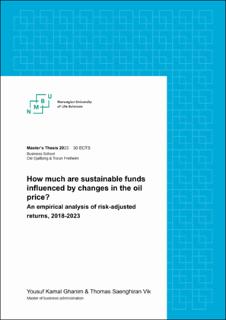| dc.description.abstract | This thesis examines the impact of oil price changes on Environmental, Social, and Governance (ESG) funds. As sustainable investment funds gain popularity in response to growing environmental concerns, understanding the relationship between oil prices and ESG fund performance becomes important. The study investigates whether variations in oil prices significantly affect the risk-adjusted returns of ESG funds and explores the mechanisms underlying this link. To achieve this objective, the research employs regression models and utilizes key performance metrics such as the information ratio, Sharpe ratio, and Jensen's Alpha. These metrics provide a comprehensive assessment of ESG fund performance, considering riskadjusted returns, reward-to-volatility ratio, and excess return relative to a benchmark. By analyzing these metrics, the study aims to ascertain the extent to which oil price changes impact ESG fund performance. The sample consists of 12 ESG funds marketed as sustainable investments, with a focus on funds managed in Norway. The data collection process involved gathering reliable information from Refinitiv Eikon, with a minimum requirement of five years of data or close to five years for each fund. The selected funds exhibit a range of investment strategies and focus areas, including renewable energy, climate action, gender equality, and exclusion of fossil fuel companies. The findings from the regression analysis indicate that while the alpha values for the funds are not statistically significant at a 5% level, the majority of the funds are significantly affected by market changes, including oil price fluctuations. This effect is observed even in funds explicitly avoiding investments in the oil and gas sectors. Additionally, the study incorporates dummy variables to investigate the impact of oil price shocks on the risk-adjusted returns of ESG funds. We find that oil prices have a significant influence on the risk-adjusted returns of ESG funds, regardless of their investment focus. Through a regression analysis, we observe that the majority of ESG funds exhibit negative oil betas, indicating that increases in oil prices negatively affect the performance of these funds. When considering the regression models that account for oil price shocks exceeding 8% and oil price shocks below -8%, we find that most of these oil price shocks are not statistically significant, indicating that ESG funds are 2 less affected by extreme oil price movements. These insights are valuable for investors, fund managers, and policymakers seeking to align financial returns with sustainability goals. The study highlights the importance of considering oil price dynamics in ESG investment strategies and provides a foundation for further research in this field. | |
